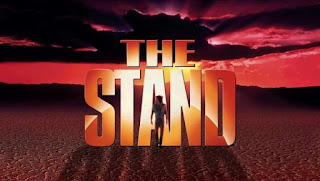Faith in Film, Week 9
As we continue our look at The Stand, we look at The Last Word on Politics in Revelation, too.
Apocalyptic tales have been a big part of the cultural landscape for a long time. Roland Emmerich, a director who broke in by giving us Independence Day with Will Smith, has long trafficked in them. Anyone remember The Day After Tomorrow? How about How about another gem, 2012, which was based on the Mayan Theory that the world would end in 2012. We’ve talked about some of the Christian theories of the coming of Christ and the end of the world, but this is another group that had its own prophecy which, likewise, didn’t seem to come to fruition.
But if natural disasters aren’t your thing, how about human-made ones? Movies like Terminator are about our technological hubris eventually plunging us into a dystopia that leads to our extinction. Or, really, that’s the underlying message that serves as a vehicle for the delivery of Arnold Schwarzenegger’s witty repartee. Or how about The Book of Eli, which posits a world where much of humanity and our structure has been wiped out because we pursued the nuclear option. That’s an interesting movie about the role religion, specifically the Bible, can play into the attempts to re-build society.
Maybe you think Stephen King wasn’t too far off and a virus will be our undoing. But what if instead of killing people, said virus turned most of the world into mindless killing machines. That is, essentially, what the whole zombie genre is all about. And in its best forms, like The Walking Dead, it’s about what happens to those who are left. How do they cope with a world where the society they once knew has crumbled? Does religion have a place? How do they govern? How do they live? What happens to morality? I know some people watch shows and movies like that because they like the tension and the carnage, and sure that’s a piece of it. But the heart of The Walking Dead, and the reason I’ve always been drawn to the show, is that while zombies are a threat, the real threat to survival is the people who are left without the structures of society to provide a context and guardrails.
A few weeks ago we looked at another Stephen King story, The Mist. And in one of the best clips, those who were trying to figure out what to do, the conversation turned to the increasing unrest and madness they were seeing. And it led to a fascinating exchange between Amanda, who advocated that people are basically good, and three men who had a dimmer view of society.
Amanda Dunfrey: You don't have much faith in humanity, do you?
Dan Miller: None, whatsoever.
Amanda Dunfrey: I can't accept that. People are basically good; decent. My god, David, we're a civilized society.
David Drayton: Sure, as long as the machines are working and you can dial 911. But you take those things away, you throw people in the dark, you scare the shit out of them - no more rules.
And it was Ollie Weeks who took it a step further, saying, “As a species we're fundamentally insane. Put more than two of us in a room, we pick sides and start dreaming up reasons to kill one another. Why do you think we invented politics and religion?” Now King didn’t craft that script specifically, but the ideas remain consistent to his overall take on this subject of society and politics. And it’s a view we see shared in The Stand as well. We'll consider that and more on Wednesday.
Discussion Questions:
1. Stories of the collapse of society are common, why do you think they appeal to people?
2. The vision of the collapse of government and society in The Stand is comprehensive, what do you take away from its take on a world racked by calamity?
3. In looking at Revelation, what protections do we have to transcend politics?




Comments
Post a Comment